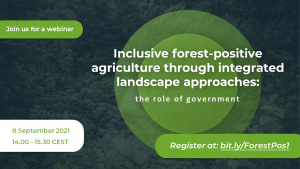Type of Dialogue
Convened by
Language of Dialogue Event
Date/time
To:
Geographical focus
Format
Please review the details below for registration information if available or contact the Convenor if you would like to attend.
Description
The Food and Agriculture Organization of the United Nations (FAO) and the Ministry of Agriculture, Forestry and Fisheries of Japan (MAFF) are pleased to invite you to the webinar “Inclusive forest-positive agriculture through integrated landscape approaches: the role of government.” This session is the first of three online events to be held in September and October under the common topic of “Halting deforestation: approaches and tools for forest-positive commodity value chains” (please scroll down for more information on the webinar series).
Date: 22 September 2021
Time: 15:00-16:30 (Rome), 22:00 (Tokyo), 9:00 (Santiago)
Language: English, French, Spanish
Recordings and materials: https://bit.ly/ForestPosWeb-rec
Outcomes:
- Provide an overview of strategic trade-offs among forest conservation, sustainable forest and land management, food security, agricultural policies, climate change mitigation and adaptation;
- Share experiences and lessons learned from countries’ efforts to design and implement integrated landscape approaches for forest-positive agriculture and to align agricultural policies and investments to forest conservation and sustainable land management;
- Identify what role governments can play in advancing inclusive forest-positive agriculture through integrated landscape approaches, and how REDD+ is supporting these approaches;
- Soft launch of the upcoming FAO technical paper on halting deforestation through forest positive agriculture and “deforestation-free” commodities: the role of governments.
ABOUT THE SEMINAR SERIES:
In tropical countries, land-use conversion to agriculture and pastureland accounts for approximately 73% of deforestation. 40% of this deforestation is attributable to pressures related to the demand for and production of commercial agricultural commodities such as beef, soy, palm oil, cocoa, timber, paper/pulp and coffee. In some of the most active fronts of deforestation, land use changes coincide with the expansion of these internationally traded commodities.
Over the past two decades, attention to the impact of demand for these ‘forest risk’ commodities in driving forest loss has increased both in consumer and producer countries. Many consumer countries have begun to identify actions to mitigate the negative consequences of their consumption of these commodities through global initiatives such as environmental standards, import regulations, due diligence processes, and continuous awareness-raising. Producer countries – boosted by more than ten years of REDD+ and, more recently, by the Paris Agreement – recognize the pressing need to address agricultural production practices to reduce deforestation and carbon emissions while pursuing social inclusion and benefit-sharing.
Corrective actions to address the impact of global commodity production and trade on forests and climate change have been taken by leading private sector actors since the early 2000s. The discourse is now evolving from deforestation-free supply chains to forest positive strategies, de-risking supply chains through certification and due-diligence processes and highlighting the opportunities of sustainable supply chains and climate finance investments.
As they are responsible for up to one-third of global GHG emissions, global food systems also offer emerging opportunities to act as prominent climate mitigation action, and may boost synergies between forest positive agriculture, climate ambitions, and forest conservation.
Acknowledgement


